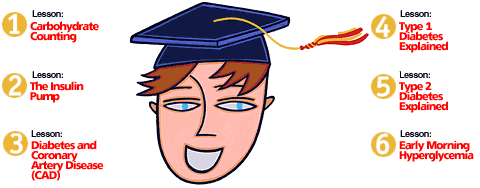



 |
|
|

|
|
Diabetes Lesson 4 - Type 1 Diabetes Explained 
The bad news is that there is currently no cure for type 1 diabetes. The good news is that there are effective treatments for it. Your doctor, nutritionist or Certified Diabetes Educator (CDE) will work with you to help establish your personal blood glucose maintenance goals, along with any medication regimens. Following are measures that your health care providers will discuss with you to help you best manage your disease and maintain your blood glucose within your ideal range:
Assignment #4
How'd it go? If you did well, then great! If not, you can always go back and review the lesson. We're sure you'll ace the quiz after that! When you are finished, move right along to the next lesson where we take a closer look at type 2 diabetes. Page 1 2 3 4 Copyright © 2000-2026 savvyHEALTH.com. All rights reserved.
|
|
|
|||||||||||||||||
|
About savvyHEALTH | Privacy | Feedback | Home
http://www.savvyHEALTH.com/
All contents copyright © 1999-2026 savvyHEALTH, Inc. All rights reserved.
This internet site provides information of a general nature and is
designed for educational purposes only. If you have any concerns about
your own health, you should always consult
with a physician or other healthcare professional. Please review the Terms of Use before using this site. Your use of the site indicates your agreement to be bound by the Terms of Use.
|
|